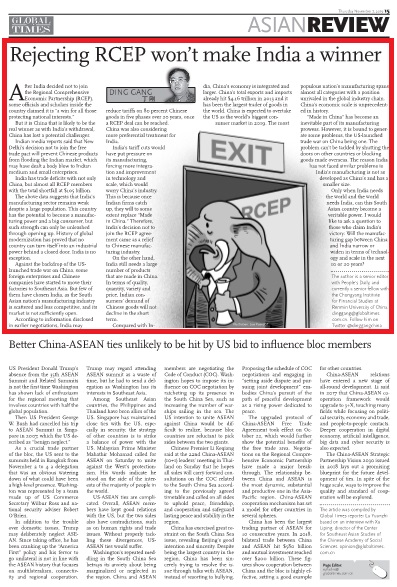Major Power Relations
Your Present Location: PROGRAMS> Major Power RelationsDing Gang: Rejecting RCEP won’t make India a winner
By Ding Gang Source: Global Times Published: 2019-11-7
After India decided not to join the Regional Comprehensive Economic Partnership (RCEP), some officials and scholars inside the country claimed it is "a win for all those protecting national interests."
But it is China that is likely to be the real winner as with India's withdrawal, China has lost a potential challenger.
Indian media reports said that New Delhi's decision not to join the free trade pact will prevent Chinese products from flooding the Indian market, which may have dealt a body blow to Indian medium and small enterprises.

India has trade deficits with not only China, but almost all RCEP members with the total shortfall at $105 billion.
The above data suggests that India's manufacturing sector remains weak despite a large population. This country has the potential to become a manufacturing power and a big consumer, but such strength can only be unleashed through opening up. History of global modernization has proved that no country can turn itself into an industrial power behind a closed door. India is no exception.
Against the backdrop of the US-launched trade war on China, some foreign enterprises and Chinese companies have started to move their factories to Southeast Asia. But few of them have chosen India, as the South Asian nation's manufacturing industry is scattered and less competitive, and its market is not sufficiently open.
According to information disclosed in earlier negotiations, India may reduce tariffs on 80 percent Chinese goods in five phases over 20 years, once a RCEP deal can be reached. China was also considering more preferential treatment for India.
India's tariff cuts would have put pressure on its manufacturing, forcing more integration and improvement in technology and scale, which would worry China's industry. This is because once Indian firms catch up, they will to some extent replace "Made in China." Therefore, India's decision not to join the RCEP agreement came as a relief to Chinese manufacturing industry.
On the other hand, India still needs a large number of products that are made in China. In terms of quality, quantity, variety and price, Indian consumers' demand of Chinese goods will not decline in the short term.
Compared with India, China's economy is integrated and larger. China's total exports and imports already hit $4.16 trillion in 2013 and it has been the largest trader of goods in the world. China is expected to overtake the US as the world's biggest consumer market in 2019. The most populous nation's manufacturing spans almost all categories with a position unrivaled in the global industry chain. China's economic scale is unprecedented in history.
"Made in China" has become an inevitable part of its manufacturing prowess. However, it is bound to generate some problems, the US-launched trade war on China being one. The problem can't be tackled by shutting the doors on other countries or blocking goods made overseas. The reason India has not faced similar problems is India's manufacturing is not as developed as China's and has a smaller size.
Only when India needs the world and the world needs India, can this South Asian country become a veritable power. I would like to ask a question to those who claim India's victory: Will the manufacturing gap between China and India narrow or widen in terms of technology and scale in the next 10 or 20 years?
The author is a senior editor with People's Daily, and currently a senior fellow with the Chongyang Institute for Financial Studies at Renmin University of China.























































































 京公网安备 11010802037854号
京公网安备 11010802037854号





